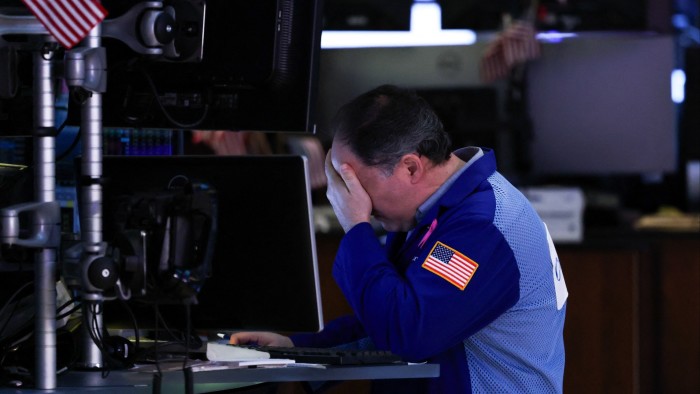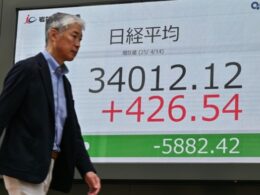Stay informed with free updates
Simply sign up to the US equities myFT Digest — delivered directly to your inbox.
Tech stocks led a Wall Street sell-off on Wednesday after chipmaker Nvidia revealed that new US controls on sales to China would wipe billions of dollars from its earnings, dragging its peers sharply lower in early trading.
The Philadelphia Semiconductor Index lost 3.7 per cent, taking its loss for the year to more than 22 per cent. All 30 of its constituent stocks fell.
Nvidia was hardest hit, down 6.4 per cent, after it said in a filing late on Tuesday that the Trump administration’s plans to clamp down on the company’s sales of its H20 chip to China would dent earnings by about $5.5bn.
Wednesday’s declines for chipmakers pulled the tech-heavy Nasdaq Composite 2 per cent lower, while the blue-chip S&P 500 lost 1.3 per cent.
“Rising AI restrictions are likely to impact other key AI-levered computing, networking and optical stocks” including Broadcom, Advanced Micro Devices and Arm, said Bank of America strategists.
The bank added, however, that AI “remains the fastest-growing secular growth opportunity” among chipmakers and that Nvidia’s decline amounted to a “buying opportunity”.
Tech stocks, which were fresh from a more than two-year rally at the start of this year, have been hit particularly hard by Donald Trump’s aggressive tariff announcements. The measures sparked a wave of selling of dollar-denominated assets and fanned concerns about slowing economic growth, with the World Trade Organization warning on Wednesday that the levies could drag the world into a recession.
The Nasdaq entered bear market territory in early April, marking a decline of more than 20 per cent from its mid-February high. But it subsequently rebounded when the White House announced a 90-day pause to the sweeping “reciprocal” tariffs Trump had earlier unleashed on all major US trading partners.
Tech stocks had climbed further on Monday after the White House over the weekend said smartphones and other consumer electronics would be excluded from its steep “reciprocal” tariffs, including those imposed on China, which had not been given a reprieve. Officials later added that such goods could later be subject to duties on semiconductors.
European stocks were also lower on Wednesday, with the region-wide Stoxx Europe 600 down 0.7 per cent and London’s FTSE 100 0.2 per cent lower by mid-afternoon.
In currency markets, the dollar fell sharply against a basket of six peers, taking its decline this year to more than 8 per cent.
Yields on US 10-Year Treasuries were flat on Wednesday morning, as were the prices of large exchange traded funds that hold high-grade and risky corporate credit.
The moves follow the release of US retail sales data showing a bigger-than-expected 1.4 per cent increase in March.
“The details of the retail sales report, including the upward revisions prior months, were somewhat stronger than our previous GDP tracking assumptions,” Goldman Sachs analysts said on Wednesday.
Bill Adams, chief economist for Comerica Bank, attributed the retail sales increase to “panic buying” as “consumers rushed to buy goods before tariffs pushed prices up”.
Adams said he expected lower consumer confidence to weigh on spending in the near future, with businesses more likely to hold off on hiring as they wait for more clarity on tariffs.
Source link









